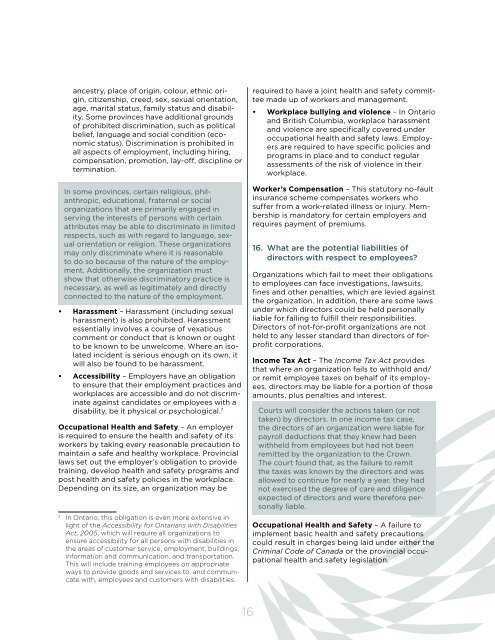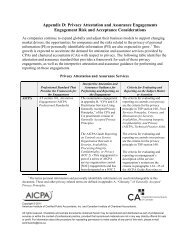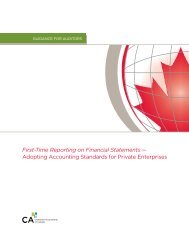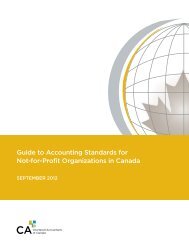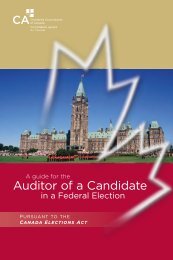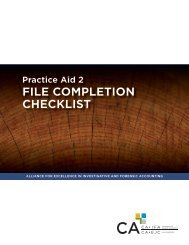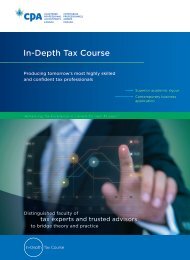2 0 questions - Canadian Institute of Chartered Accountants
2 0 questions - Canadian Institute of Chartered Accountants
2 0 questions - Canadian Institute of Chartered Accountants
Create successful ePaper yourself
Turn your PDF publications into a flip-book with our unique Google optimized e-Paper software.
ancestry, place <strong>of</strong> origin, colour, ethnic origin,citizenship, creed, sex, sexual orientation,age, marital status, family status and disability.Some provinces have additional grounds<strong>of</strong> prohibited discrimination, such as politicalbelief, language and social condition (economicstatus). Discrimination is prohibited inall aspects <strong>of</strong> employment, including hiring,compensation, promotion, lay-<strong>of</strong>f, discipline ortermination.In some provinces, certain religious, philanthropic,educational, fraternal or socialorganizations that are primarily engaged inserving the interests <strong>of</strong> persons with certainattributes may be able to discriminate in limitedrespects, such as with regard to language, sexualorientation or religion. These organizationsmay only discriminate where it is reasonableto do so because <strong>of</strong> the nature <strong>of</strong> the employment.Additionally, the organization mustshow that otherwise discriminatory practice isnecessary, as well as legitimately and directlyconnected to the nature <strong>of</strong> the employment.• Harassment – Harassment (including sexualharassment) is also prohibited. Harassmentessentially involves a course <strong>of</strong> vexatiouscomment or conduct that is known or oughtto be known to be unwelcome. Where an isolatedincident is serious enough on its own, itwill also be found to be harassment.• Accessibility – Employers have an obligationto ensure that their employment practices andworkplaces are accessible and do not discriminateagainst candidates or employees with adisability, be it physical or psychological. 7Occupational Health and Safety – An employeris required to ensure the health and safety <strong>of</strong> itsworkers by taking every reasonable precaution tomaintain a safe and healthy workplace. Provinciallaws set out the employer’s obligation to providetraining, develop health and safety programs andpost health and safety policies in the workplace.Depending on its size, an organization may be7In Ontario, this obligation is even more extensive inlight <strong>of</strong> the Accessibility for Ontarians with DisabilitiesAct, 2005, which will require all organizations toensure accessibility for all persons with disabilities inthe areas <strong>of</strong> customer service, employment, buildings,information and communication, and transportation.This will include training employees on appropriateways to provide goods and services to, and communicatewith, employees and customers with disabilities.required to have a joint health and safety committeemade up <strong>of</strong> workers and management.• Workplace bullying and violence – In Ontarioand British Columbia, workplace harassmentand violence are specifically covered underoccupational health and safety laws. Employersare required to have specific policies andprograms in place and to conduct regularassessments <strong>of</strong> the risk <strong>of</strong> violence in theirworkplace.Worker’s Compensation – This statutory no-faultinsurance scheme compensates workers whosuffer from a work-related illness or injury. Membershipis mandatory for certain employers andrequires payment <strong>of</strong> premiums.16. What are the potential liabilities <strong>of</strong>directors with respect to employees?Organizations which fail to meet their obligationsto employees can face investigations, lawsuits,fines and other penalties, which are levied againstthe organization. In addition, there are some lawsunder which directors could be held personallyliable for failing to fulfill their responsibilities.Directors <strong>of</strong> not-for-pr<strong>of</strong>it organizations are notheld to any lesser standard than directors <strong>of</strong> forpr<strong>of</strong>itcorporations.Income Tax Act – The Income Tax Act providesthat where an organization fails to withhold and/or remit employee taxes on behalf <strong>of</strong> its employees,directors may be liable for a portion <strong>of</strong> thoseamounts, plus penalties and interest.Courts will consider the actions taken (or nottaken) by directors. In one income tax case,the directors <strong>of</strong> an organization were liable forpayroll deductions that they knew had beenwithheld from employees but had not beenremitted by the organization to the Crown.The court found that, as the failure to remitthe taxes was known by the directors and wasallowed to continue for nearly a year, they hadnot exercised the degree <strong>of</strong> care and diligenceexpected <strong>of</strong> directors and were therefore personallyliable.Occupational Health and Safety – A failure toimplement basic health and safety precautionscould result in charges being laid under either theCriminal Code <strong>of</strong> Canada or the provincial occupationalhealth and safety legislation.16


